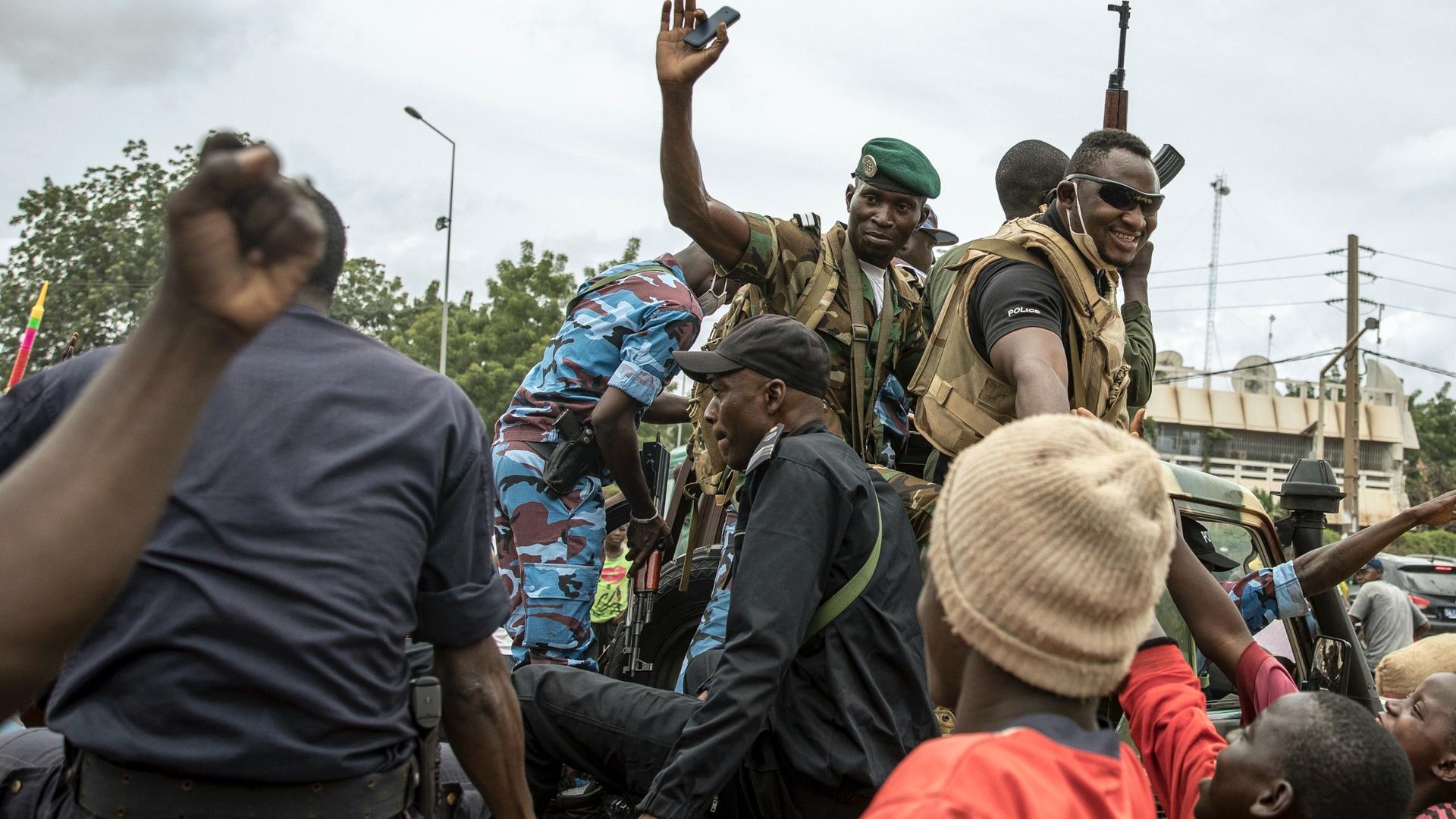When Mali’s military arrested former President Ibrahim Boubacar Keïta to protect the nation as a “true democracy,” crowds in the capital Bamako erupted in cheers.
Two weeks later, that enthusiasm has not waned — at least within Mali.
Related: Protesters in Mali call for president to step down
A different story has played out beyond the country’s borders. Regional and world leaders have continued to condemn the military coup and are calling for a swift return to civilian leadership.
From the onset, the National Committee for the Salvation of the People (CNSP), the military junta headed by Colonel Assimi Goita, has promised to pave the way to new elections. Still up for debate, however, is the timeline of that transition, and whether it will be the military that leads it.
“We are already seeing these kinds of diversions appearing within the group of civilian and military who actually converged to ask for the departure of former President Keïta.”
“We are already seeing these kinds of diversions appearing within the group of civilian and military who actually converged to ask for the departure of former President Keïta,” said Gilles Yabi, director of the Citizen Think Tank of West Africa (WATHI) in neighboring Dakar, Senegal.
The country’s M5-RFP movement, which led to recent massive protests calling on Keïta’s resignation, has reportedly been excluded from transition talks with the military. (M5-RFP is an umbrella coalition of civil society groups, religious leaders and political parties that stands for the June 5 – Rally of Patriotic Forces Movement.)
Some are concerned the military junta might be trying to hold onto power in this transition.
“We are going to see a lot of discussions again in the coming days so that there is an agreement that will preserve the possibility for the transition to be a positive step for Mali,” Yabi said. “But that’s not for now sure.”
Many Malians aren’t necessarily for the military to go, says Sidiki Guindo, a Malian statistician and director of the polling institute GISSE, based in Bamako, Mali’s capital.
GISSE recently completed a poll looking at how Malians in Bamako viewed the coup. 88% said they had a favorable view of the military leaders.
“Basically, we found that despite what most people think, the population has a quite positive image of the military leaders who did this.”
“Basically we found that despite what most people think, the population has a quite positive image of the military leaders who did this,” said Guindo, noting that most Malians polled didn’t view the military’s actions as a coup d’etat but rather as a resignation.
The vast majority approved of Keïta’s resignation, which isn’t surprising considering the months of protests in Bamako that precede the coup itself.
When it comes to Mali’s future, the same poll found more than half of Malians, or 57%, thought the transition should be managed by civilians and the military. In comparison, 27% wanted a military-only transition, and 16% civilian-led.
“These are statistics that prove that there remains a big gap today between the population and the politicians that lead us,” Guindo said. He notes, however, that those attitudes could change in the coming months, depending on whether military clings to power.
“I don’t think that the military junta should be keeping power during the transition. But I think the military junta should facilitate putting in place a civilian transition,” Yabi said.
He notes, however, that transitioning the government to democratic elections is only the beginning. Deeper political and institutional transformation is required, he says.
“I think what needs to change in Mali is how politics is done. And how the state is managed,” Yabi said. “Getting elections will not solve the problems of failure in institutional building.”
With Mali’s transition hanging in the balance, the Economic Community of West African States (ECOWAS) has said it will only begin to lift sanctions once the military complies with their demands.
Related: Policymakers rush to stave off economic collapse on African continent
On Friday, during a regional virtual meeting, ECOWAS told the junta to immediately transfer power, calling for the appointment of a transitional president, and new legislative and presidential elections held within a year.
Many Malians don’t appreciate the pressure from the regional body.
“Concerning the decisions taken by the ECOWAS, I condemn in the strongest terms this embargo,” said Mahamadou Cissé, president of the National Malian Youth Council of France. The 32-year-old old lives in Paris.
“It’s just not logical, a country already suffering from multiple crises. There’s no point in strangling its people even further.”
In recent years, Mali has struggled to counter growing terrorism threats and intercommunal violence, as well as address youth employment.
These are the issues Cissé, along with many Malian youths, are eager for their leaders to solve.
“I think that Malians have given enough trust to politicians, and until now, we’ve been let down. … Now, the new political leader that will take hold of the country’s future will have to work at regaining the lost confidence.”
“I think that Malians have given enough trust to politicians, and until now, we’ve been let down,” he said. “Now, the new political leader that will take hold of the country’s future will have to work at regaining the lost confidence.”
Our coverage reaches millions each week, but only a small fraction of listeners contribute to sustain our program. We still need 224 more people to donate $100 or $10/monthly to unlock our $67,000 match. Will you help us get there today?
